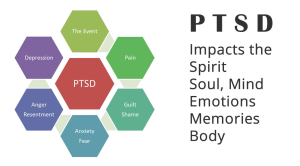At the moment we seem to be flooded with trauma stories; recent events such as the attack in Manchester, the fire and the several attacks in London are all extremely traumatic events that can cause severe and lasting effects on the people involved in them. In this post we just wanted to give you an outline of what PTSD is and its symptoms, so you can look out for signs in yourself and your loved ones. If you have experienced a traumatic event, please do contact us – you don’t have to go through it alone. We have specialist trained therapists that can help you heal.
 What is PTSD?
What is PTSD?
Post-Traumatic Stress Disorder (PTSD) is the name given to psychological and physical problems that can sometimes follow experiencing, witnessing or being confronted by an event, which results in actual or threatened death, serious injury or threat to self or others.
These traumatic events might include:
- A major disaster
- War
- Rape or sexual assault
- Physical or emotional abuse, such as domestic abuse
- A serious accident
- Other situations in which a person was very afraid, horrified, helpless or felt that his/her life was in danger
The trauma can be a single event or a series of events taking place over many months or even years.
Who can be affected by PTSD?
People of any age can develop PTSD who have been involved in a traumatic event or situation. It may also develop in members of the emergency services or in families of those involved in a traumatic event.
Symptoms of PTSD
People react to trauma in different ways. Below are some of the symptoms that can be caused if you are suffering from PTSD.
- Recurrent, involuntary, intrusive and distressing memories.
- Recurrent and distressing dreams.
- Difficulty falling asleep, staying asleep or having restless sleep.
- Flashbacks.
- Avoiding memories, thoughts and feelings by trying to repress them.
- Inability to remember important aspect of event/s, which may occur only once or multiple times – this is not ordinary forgetting but is generally selective, leading to some degree of functional impairment, and is not due to physiological conditions.
- Negative beliefs or expectations about yourself, others and the world.
- Negative thoughts about causes or consequences of the event/s including blaming yourself, and others.
- Persistently feeling negative emotions such as fear, horror, anger, guilt, shame.
- Not being able to participate in activities that used to interest you.
- Feeling isolated, detached and withdrawing into yourself.
- Feeling numb and empty.
- Not being able to experience positive emotions (happiness, satisfaction, love).
- Irritable behaviour and angry outbursts expressed as verbal or physical aggression to people or objects.
- Reckless or self-destructive behaviours.
- Alcohol / substance misuse, eating disorders such as overeating or controlling what you eat meticulously.
- Hyper-vigilance, not being able to trust anyone, feeling suspicious.
- Relationship problems.
- Problems with concentration.
- Feeling suicidal.
When do symptoms develop?
Symptoms can develop immediately after the traumatic event. But the onset may be delayed in some people until months or even years later.
If you have experienced a traumatic event in the past, even if it was years ago and you feel that you are reliving it by getting flashbacks and nightmares that are causing you to shake, sweat or feel sick, or if you’re experiencing any of the other symptoms above, then contact your GP, as you may be suffering from PTSD.


Leave a Reply